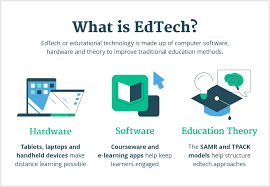The Impact of EdTech on Modern Education
Education technology, commonly referred to as EdTech, has revolutionized the way we learn and teach in the modern world. With the integration of digital tools and resources into educational practices, EdTech has brought about significant changes and improvements in the field of education.
One of the key benefits of EdTech is its ability to enhance accessibility to education. Through online learning platforms, students can access educational materials and resources anytime, anywhere, breaking down geographical barriers and providing opportunities for lifelong learning.
EdTech also personalizes the learning experience for students. Adaptive learning software and online assessments allow educators to tailor their teaching methods to individual student needs, promoting better engagement and understanding of concepts.
Furthermore, EdTech promotes collaboration among students and teachers. Virtual classrooms, video conferencing tools, and online discussion forums enable communication and interaction beyond physical boundaries, fostering a sense of community among learners.
Another advantage of EdTech is its ability to track and analyze student progress effectively. Learning management systems and data analytics provide valuable insights into student performance, allowing educators to make data-driven decisions to improve teaching strategies and student outcomes.
Despite its numerous benefits, EdTech also presents challenges such as the digital divide, privacy concerns, and the need for adequate training for educators to effectively utilize these technologies in the classroom.
In conclusion, EdTech has transformed education by making it more accessible, personalized, collaborative, and data-driven. As technology continues to advance, it is essential for educators to embrace these tools responsibly to create a more engaging and effective learning environment for students in the digital age.
Top 5 Frequently Asked Questions About EdTech: Understanding Its Impact, Benefits, Challenges, and Future Trends
- What is EdTech and how does it impact education?
- What are the benefits of integrating technology into education?
- How can EdTech help improve student learning outcomes?
- What are some common challenges faced in implementing EdTech in schools?
- What are the current trends and future directions of EdTech?
What is EdTech and how does it impact education?
EdTech, short for education technology, refers to the integration of digital tools and resources into educational practices to enhance teaching and learning experiences. The impact of EdTech on education is profound, as it revolutionizes traditional teaching methods by providing increased accessibility to educational materials, personalized learning experiences for students through adaptive software, fostering collaboration among learners and educators through online platforms, and enabling data-driven decision-making to improve student outcomes. EdTech has the potential to transform education by making it more engaging, effective, and inclusive in the digital age.
What are the benefits of integrating technology into education?
Integrating technology into education offers a multitude of benefits that enhance the learning experience for both students and educators. Technology provides access to a vast array of educational resources and tools, making learning more interactive, engaging, and personalized. It allows for greater flexibility in teaching methods, catering to diverse learning styles and individual student needs. Additionally, technology promotes collaboration and communication among students and teachers, fostering a dynamic learning environment that encourages creativity and critical thinking skills. By integrating technology into education, students are better prepared for the digital world and can develop essential 21st-century skills that are crucial for their future success.
How can EdTech help improve student learning outcomes?
Utilizing EdTech can significantly enhance student learning outcomes by providing personalized learning experiences, interactive tools, and real-time feedback mechanisms. Through adaptive learning platforms and educational apps, students can engage with content at their own pace and receive customized support based on their individual needs. Additionally, interactive multimedia resources and simulations can make complex concepts more understandable and engaging for students, leading to improved retention and comprehension. Furthermore, EdTech enables educators to track student progress more effectively, identify areas for improvement, and tailor instruction accordingly, ultimately leading to enhanced academic performance and overall learning outcomes.
What are some common challenges faced in implementing EdTech in schools?
Implementing EdTech in schools presents several common challenges that educators and administrators often encounter. One major challenge is the lack of adequate training and professional development for teachers to effectively integrate technology into their teaching practices. Additionally, the digital divide among students, where some may not have access to necessary devices or reliable internet connectivity at home, can hinder equal participation in online learning activities. Privacy concerns related to student data and online security also pose challenges in implementing EdTech in schools, requiring strict protocols and safeguards to protect sensitive information. Overcoming these challenges requires a comprehensive approach that includes ongoing training for educators, equitable access to technology for all students, and robust measures to ensure data privacy and security in educational settings.
What are the current trends and future directions of EdTech?
The current trends in EdTech are focused on the integration of artificial intelligence, virtual reality, and personalized learning technologies into educational practices. These advancements aim to enhance student engagement, improve learning outcomes, and provide more tailored educational experiences. Additionally, the future direction of EdTech is likely to involve a greater emphasis on data analytics and adaptive learning systems to better track student progress and customize learning pathways. Collaborative tools, online assessment platforms, and mobile learning solutions are also expected to play a significant role in shaping the future of education technology, making learning more interactive, accessible, and effective for students of all ages.

